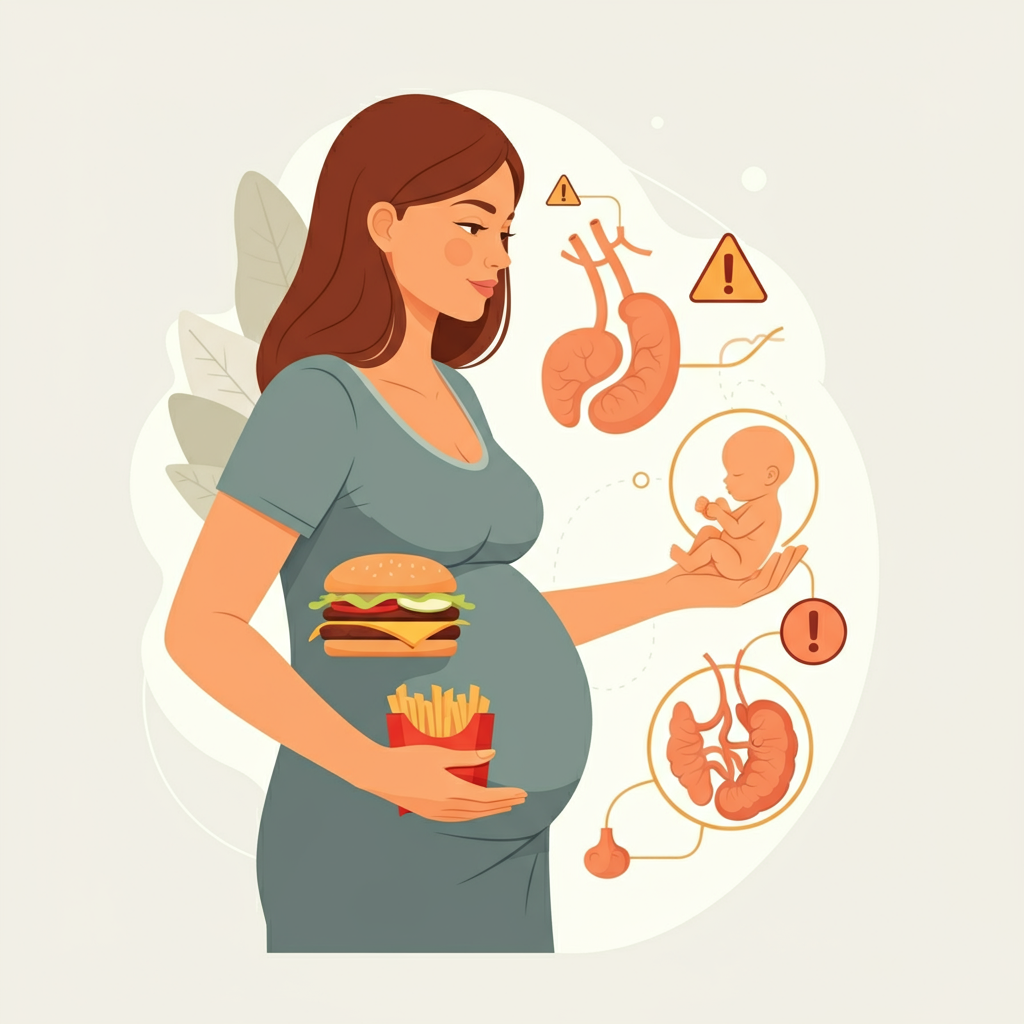When we think about preparing for pregnancy, we often focus on taking prenatal vitamins, scheduling doctor’s visits, and monitoring our physical health. But what we eat before pregnancy is equally crucial, as recent research has revealed. Consuming a diet high in sugar and fat, typical of many fast-food meals, can have both immediate and long-term consequences on your baby’s health—even before conception.
This article explores how fast food impacts maternal and infant health, the hidden risks of poor nutrition, and why prioritizing a balanced diet before pregnancy is an investment in your child’s future well-being.
The Impact of Fast Food on Pre-Pregnancy Health
Fast food is often loaded with unhealthy fats, excessive sugar, and minimal nutrients. While an occasional burger or fries might not seem harmful, regular consumption can silently affect your body in ways that might not be immediately visible. Even women who appear to be a healthy weight could carry hidden risks such as increased fat mass or fatty liver without realizing it.
These conditions don’t just affect personal health; they can reduce your ability to produce healthy breast milk post-pregnancy and alter fetal development. Research shows that diets high in processed foods lead to poorer outcomes for both mothers and their babies, with an increased risk of diabetes, heart disease, and stroke for the child later in life.
Long-Term Health Risks for Mothers and Babies
A study led by researchers from St. John’s College, University of Cambridge, found that even short exposure to a high-sugar and high-fat diet can trigger long-term health complications for both mom and baby. Here are some of the key risks identified:
- Maternal Health Challenges
Fast food consumption may result in fatty liver and higher levels of adipose tissue (body fat), creating conditions where severe liver scarring or even liver failure can develop over time.
- Fetal Development Issues
While a baby’s weight might not significantly change due to fast-food consumption, their nutrition can be affected in the womb. Poor nutrition during pregnancy may lead to altered placental function, reducing the supply of essential nutrients to the fetus.
- Breast Milk Quality
After birth, a diet heavy in fast food compromises the nutritional quality of the mother’s milk. It lowers milk protein composition, which is vital for the child’s health and survival during the early postnatal phase.
Hidden Risks in Healthy-Looking Pregnancies
One of the more startling findings from this study is how subtle these impacts can be in women who look outwardly healthy. Women of average weight might not notice any major physical changes caused by a fast-food-heavy diet. However, internally, fat accumulation and changes to organs like the liver can quietly progress, leading to difficulties during and after pregnancy.
“The striking part is that a short exposure to a diet before pregnancy that may not noticeably change a woman’s body size or weight may still have implications for the mother’s and baby’s health,” says Professor Amanda Sferruzzi-Perri, one of the study’s lead authors.
Such hidden risks highlight the importance of educating women about how their diet—even years before conception—can indirectly affect their child’s development and health.
How Fast Food Affects Postpartum Care
Beyond pregnancy, an unhealthy diet pre-conception sets a precedent for challenges during the postpartum period. Here is how it plays out:
- Lower Neonatal Survival
The quality of breast milk is closely tied to maternal diet. A high-fat, high-sugar diet reduces milk quality, which can impact infant development and survival post-birth.
- Long-Term Health Implications
Children born to mothers who consumed poor diets are at a higher risk for obesity, diabetes, and even cardiovascular diseases later in life.
The Role of Socioeconomic Factors
It’s essential to acknowledge how socioeconomic barriers can affect dietary choices. Fast food is often cheaper and more accessible than fresh produce or lean meats, making it a more viable option for low-income families. With the rising cost of living, financially disadvantaged mothers might feel forced to rely on nutritionally poor fast food.
This creates a cycle where poverty heavily influences maternal health and passes on potential health risks to the next generation. Addressing this issue through education, access to healthier food options, and support for expecting mothers is vital.
Steps for a Healthier Pre-Conception Diet
The good news is that these risks can be mitigated with a focus on nutritious eating habits before and during pregnancy. Here’s how you can prioritize your health and your baby’s well-being:
- Swap Processed Foods for Whole Foods
Incorporate more whole grains, fresh fruits, vegetables, lean proteins, and healthy fats into your daily meals. Avoid sugary beverages and snacks.
- Plan and Prep Meals
Planning meals in advance can help reduce reliance on high-calorie fast food. Batch-cooking healthy meals for the week makes it easier to avoid the drive-thru.
- Educate Yourself
Learn about the nutritional value of the foods you eat. Apps and online resources can help you track your intake of critical nutrients like folate, calcium, and iron, which are essential before and during pregnancy.
- Stay Active
Physical activity supports healthy metabolism and helps manage body weight and blood sugar levels effectively. A simple 30-minute walk a day can make a big difference.
- Seek Professional Guidance
Consult a nutritionist or healthcare provider for personalized dietary advice tailored to your needs and lifestyle.
Final Thoughts
Your health choices before pregnancy lay the foundation for your baby’s future. Eating excessive fast food might appear harmless in the short term, but the hidden effects can be far-reaching for both you and your child. By committing to a balanced, nutrient-rich diet, you can take a proactive step to ensure the best possible outcomes for your child’s health.
Remember, even small changes can create a massive ripple effect. Start today by choosing one wholesome, balanced meal over fast food, and gradually build healthier habits.
Taking charge of your nutrition is a meaningful way to support your family’s well-being, one step at a time. Investing in yourself is investing in your future child’s health.








